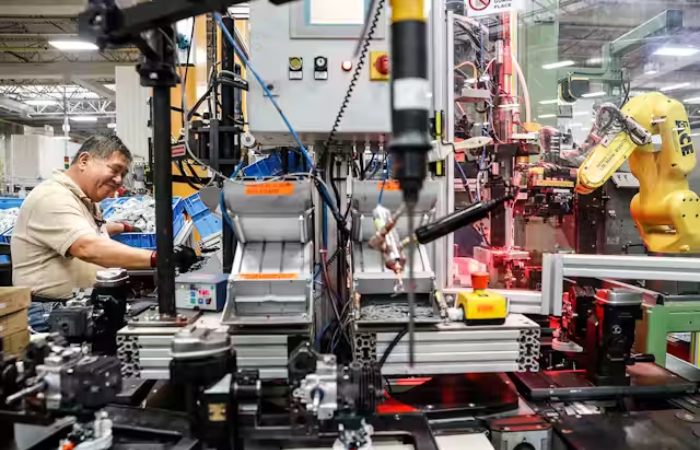Artificial intelligence (AI) is changing the labor market, creating new jobs while automating routine tasks. Between 20 and 50 million new jobs are expected by 2030, Work Market and AI is developing and improving employment in healthcare, pharmaceuticals, and other industries.
AI rapidly transforms the workforce, with significant changes already visible across the labor market and employment landscape. As AI develops and evolves, businesses and workers must adapt to remain competitive and efficient.
In this blog, we’ll explore how AI affects the workforce, how it can help workers and industries become more efficient, and the potential pros and cons of AI implementation on a larger scale.
Impact of AI on Job Roles

The rise of mechanization and artificial intelligence is transforming the workplace and affecting jobs in various sectors, including high-tech manufacturing. Many manual and boring tasks can now be automated thanks to advanced technologies, increasing efficiency and productivity.
But this change also leads to an evolution of professions, some of which become obsolete while new ones emerge. For example, manufacturing workers must learn new skills to operate and uphold machines and robots that perform manual tasks.
Integrating AI into high-tech manufacturing processes also creates new positions, such as data analysts, AI programmers, and machine learning specialists.
Additionally, people should stay informed about the latest advances in AI and how they affect their industry. This may involve following industry publications, attending conferences, and networking with peers and experts.
Finally, individuals must remain flexible and adaptable as the labor market and employment landscape rapidly evolve in response to AI and other technological advances. By embracing change and continually developing their skills and knowledge, individuals can thrive in a world where AI transforms how we work.
Impact of AI on the Workforce (Work Market)
The effect of AI on the workforce is multifaceted. This involves automating repetitive and routine tasks, changes in required skills, and job displacement. This can benefit employees, allowing them to focus on more complex and creative work.
However, it can also raise concerns about job losses and changes in demand for certain types of work. However, AI also creates new job opportunities, particularly in data analysis, machine learning, and AI development.
Despite these potential benefits, concerns remain about the downsides of implementing AI on a larger scale in the labor market. A possible problem is job losses, leading to unemployment and the need for reskilling and upskilling.
Another concern is the potential for bias and discrimination in algorithms, which can negatively impact marginalized people and communities.
Privacy and security are also significant concerns regarding the impact of AI on the workforce. As AI advances, it is important to protect personal data and AI systems from cyberattacks.
However, AI can also improve efficiency and productivity, and its advances can open up new job opportunities for workers with the right skills and knowledge.
Impact of AI on Employment (Work Market)

Artificial intelligence (AI) is changing the labor market, creating new jobs and improving existing ones. As AI continues to develop and evolve, it is important to understand its impact on the job market, emerging new jobs, and its potential impact on unemployment rates and the economy. Together.
According to a report by McKinsey & Company, AI is expected to create between 20 and 50 million new jobs worldwide by 2030. These new jobs will occur across several industries, including healthcare, manufacturing, and finance. Some of the latest job roles emerging through AI include:
- AI Trainers and Educators: People responsible for training and teaching AI systems. They ensure that AI algorithms are accurate and efficient and develop new AI applications and systems.
- Data Analysts and Scientists: With the increased data generated by artificial intelligence systems, there is a growing demand for people who can analyze and interpret this data. Data analysts and scientists use artificial intelligence tools to analyze data and identify patterns and insights that can help businesses make better decisions.
- Human-Machine Team Leaders: As AI is increasingly integrated into the workplace, there is a growing need for people who can manage the interaction between humans and machines. Human-machine team leaders ensure that AI systems work effectively with human workers, improving productivity and efficiency.
- AI Ethics and Policy Specialists: As AI becomes more prevalent, there is a growing need for individuals who can address AI’s ethical and policy implications. AI policy and ethics specialists ensure that AI systems are developed and used responsibly and ethically.
In addition to its impact on employment, AI also has the potential to impact the economy as a whole. AI can lead to increased productivity and production, which can boost economic growth. However, concerns exist about AI’s potential to widen the wealth gap, as those with the skills and knowledge to work with AI can earn higher salaries than those without. I don’t have any.
Challenges for AI in the Job Market (Work Market)
Job Displacement: One of the main anxieties associated with AI is the possible displacement of human workers.
Jobs that involve repetitive, mundane tasks, like data entry or working on an assembly line, are becoming increasingly automated.
This displacement can lead to economic and social challenges, including unemployment and income inequality.
Skills mismatch: Jobs created by AI may require a different skill set than those they replace. This skills mismatch can create challenges for people who may find their current skills outdated or irrelevant. Reskilling and upskilling initiatives become essential to close the gap and ensure a smooth transition to new roles.
Ethical considerations: As AI takes on more decision-making responsibilities, ethical considerations become essential. Potential algorithm biases or a lack of transparency can lead to discriminatory results.
Ensuring ethical AI practices and guidelines becomes crucial to maintaining fairness and accountability in the labor market.
Job transformation and reskilling: Although some job functions can be automated, AI also has the potential to transform existing roles rather than eliminate them.
Jobs that require repetitive tasks can be supplemented with artificial intelligence technologies, allowing workers to focus on higher value-added activities.
However, this transformation requires workers to retrain and adapt to new professional requirements. The challenge is providing adequate support and resources so people acquire the skills needed to succeed in these transformed roles Work Market.
Final Thoughts
Technology has evolved unprecedentedly, and with it, our professional roles. Automation and AI are changing how we work and are starting to see significant impacts across various industries. While some jobs are at risk of becoming automated, others are evolving to include AI Work Market.
The impact of AI on professional roles is significant and profound. It is essential to approach this transformation proactively, ensuring that the benefits of AI are balanced with the needs of workers and society. In doing so, we can create a future where AI and human workers can work together seamlessly to achieve common goals and drive progress Work Market.

